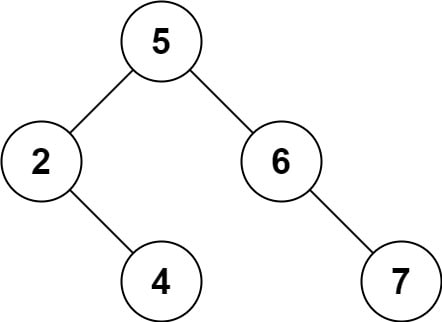Given a root node reference of a BST and a key, delete the node with the given key in the BST. Return the root node reference (possibly updated) of the BST.
Basically, the deletion can be divided into two stages:
- Search for a node to remove.
- If the node is found, delete the node.
Example 1:
Input: root = [5,3,6,2,4,null,7], key = 3
Output: [5,4,6,2,null,null,7]
Explanation: Given key to delete is 3. So we find the node with value 3 and delete it.
One valid answer is [5,4,6,2,null,null,7], shown in the above BST.
Please notice that another valid answer is [5,2,6,null,4,null,7] and it's also accepted.

Example 2:
Input: root = [5,3,6,2,4,null,7], key = 0
Output: [5,3,6,2,4,null,7]
Explanation: The tree does not contain a node with value = 0.
Example 3:
Input: root = [], key = 0
Output: []
Constraints:
- The number of nodes in the tree is in the range
[0, 104]. -
-105 <= Node.val <= 105 - Each node has a unique value.
-
rootis a valid binary search tree. -
-105 <= key <= 105
Follow up: Could you solve it with time complexity O(height of tree)?
SOLUTION:
# Definition for a binary tree node.
# class TreeNode:
# def __init__(self, val=0, left=None, right=None):
# self.val = val
# self.left = left
# self.right = right
class Solution:
def insert(self, root, node):
if root:
if node:
if node.val <= root.val:
root.left = self.insert(root.left, node)
else:
root.right = self.insert(root.right, node)
else:
root = node
return root
def deleteNode(self, root: Optional[TreeNode], key: int) -> Optional[TreeNode]:
if root:
if root.val == key:
root = self.insert(root.left, root.right)
elif key < root.val:
root.left = self.deleteNode(root.left, key)
else:
root.right = self.deleteNode(root.right, key)
return root
else:
return None



Top comments (0)